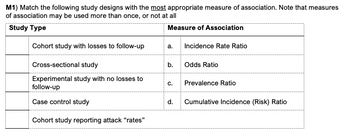
Advanced Engineering Mathematics
10th Edition
ISBN: 9780470458365
Author: Erwin Kreyszig
Publisher: Wiley, John & Sons, Incorporated
expand_more
expand_more
format_list_bulleted
Question

Transcribed Image Text:**Educational Content: Understanding Measures of Association in Research Study Designs**
In epidemiological research, different study designs are aligned with specific measures of association to interpret and analyze data effectively. Here's a guide to matching study designs with their most appropriate measures of association:
1. **Cohort Study with Losses to Follow-up**
- **Measure of Association**: Incidence Rate Ratio
- Typically used when dealing with time-to-event data where participant follow-up varies in duration.
2. **Cross-sectional Study**
- **Measure of Association**: Prevalence Ratio
- Suitable for studies that assess the prevalence of a condition or characteristic at a single point in time.
3. **Experimental Study with No Losses to Follow-up**
- **Measure of Association**: Cumulative Incidence (Risk) Ratio
- This measure is best when the focus is on calculating the risk of an outcome in experimental conditions without follow-up attrition.
4. **Case Control Study**
- **Measure of Association**: Odds Ratio
- Commonly used to estimate the odds of exposure in cases versus controls, especially in retrospective studies.
5. **Cohort Study Reporting Attack “Rates”**
- **Measure of Association**: Incidence Rate Ratio
- Effective for comparing the incidence rates of an event between different population groups.
Understanding these associations ensures that researchers and students can appropriately evaluate study findings and contribute to evidence-based practice.
Expert Solution
This question has been solved!
Explore an expertly crafted, step-by-step solution for a thorough understanding of key concepts.
This is a popular solution
Trending nowThis is a popular solution!
Step by stepSolved in 2 steps with 2 images

Knowledge Booster
Similar questions
- Which of the following data collection methods produces the highest level of evidence? Cross-sectional survey Case-control study Cohort study Systematic reviewarrow_forwardIn a case-control study the association was examined between smoking and risk of Parkinson's disease. The table below provides the results. Find the following; Odds ratio Attributable Risk Risk Ratio Risk Difference Cancer No cancer Smokers 60 33 Non smokers 40 65arrow_forwardGiven the following data set, find the lower quartile: 12,13,5,8,9,20,16,14,14,6,9,12,12arrow_forward
- Why is the combination of the measures of central tendency and measures of variation so informative about a data set? Explain how they work together to provide a complete picture.arrow_forwardValues 2- -2 Group 1 Data Set 1 Example Data by Groups Group 2 Group 3 Values 20- 10- -10- Group 1 Data Set 2 Example Data by Groups Group 2 Group 3arrow_forwardDefine population and sample. List typical parameters from population and sample statistics.arrow_forward
- You collect information on a random sample of women and obtain estimates on vitamin D exposure. However, the results that you find are different than those conducted at another study site. Should you be concerned? Explain your answer using the concept of sampling variabilityarrow_forwardIndicate the levels for which measures are being obtained in each type of study of the observational studies: cross-sectional, case-control, and cohort studies using the book of Robert H. Friis; Thomas Sellers.arrow_forwardA stratified sample is sometimes recommended when?arrow_forward
- Consider the following research questions/study scenarios. For each study, discuss the most appropriate methods for describing the data (graphically and numerically). What statistical method would be most appropriate for addressing the research questions? Be sure to provide a justification of the statistical method. What statistical test is needed, provide appropriate null and research hypotheses. An investigation of the association between drink preferences and the color of teeth is proposed. Subjects will be surveyed as to the type of drink most often consumed (coffee/tea. Juice, caramel-colored soda, water, or milk). A clinical exam will be performed after dental cleaning to determine the color of the teeth (reddish brown, reddish yellow, gray, reddish gray).arrow_forwardI UNDERSTAND 2,3,4 BUT I DON'T GET NUMBER 1 QUESTION? Thread prompt: An epidemiologist found five cases of “big toe cancer” in the Yukon Territory. Because there were only a few cases, the epidemiologist decided to conduct a matched case-control study to determine whether shoe size larger than 9 is a risk factor for big toe cancer. Cases were individually matched to one control for daily activity, history of athlete’s foot, and history of ingrown toenails. The following data were gathered: Shoe size > 9 Pair Case Control 1 Yes No 2 No No 3 No Yes 4 Yes Yes 5 No Yes Compute the proper measure of association. Interpret your results. If you were to investigate a rare cancer in Lynchburg, where might you look for data? What would be necessary legally and ethically to be able to utilize this data set(s)?arrow_forwardBinary, or Yes/No data are easily summarized numerically with median proportion sum Opi chartarrow_forward
arrow_back_ios
SEE MORE QUESTIONS
arrow_forward_ios
Recommended textbooks for you
 Advanced Engineering MathematicsAdvanced MathISBN:9780470458365Author:Erwin KreyszigPublisher:Wiley, John & Sons, Incorporated
Advanced Engineering MathematicsAdvanced MathISBN:9780470458365Author:Erwin KreyszigPublisher:Wiley, John & Sons, Incorporated Numerical Methods for EngineersAdvanced MathISBN:9780073397924Author:Steven C. Chapra Dr., Raymond P. CanalePublisher:McGraw-Hill Education
Numerical Methods for EngineersAdvanced MathISBN:9780073397924Author:Steven C. Chapra Dr., Raymond P. CanalePublisher:McGraw-Hill Education Introductory Mathematics for Engineering Applicat...Advanced MathISBN:9781118141809Author:Nathan KlingbeilPublisher:WILEY
Introductory Mathematics for Engineering Applicat...Advanced MathISBN:9781118141809Author:Nathan KlingbeilPublisher:WILEY Mathematics For Machine TechnologyAdvanced MathISBN:9781337798310Author:Peterson, John.Publisher:Cengage Learning,
Mathematics For Machine TechnologyAdvanced MathISBN:9781337798310Author:Peterson, John.Publisher:Cengage Learning,


Advanced Engineering Mathematics
Advanced Math
ISBN:9780470458365
Author:Erwin Kreyszig
Publisher:Wiley, John & Sons, Incorporated

Numerical Methods for Engineers
Advanced Math
ISBN:9780073397924
Author:Steven C. Chapra Dr., Raymond P. Canale
Publisher:McGraw-Hill Education

Introductory Mathematics for Engineering Applicat...
Advanced Math
ISBN:9781118141809
Author:Nathan Klingbeil
Publisher:WILEY

Mathematics For Machine Technology
Advanced Math
ISBN:9781337798310
Author:Peterson, John.
Publisher:Cengage Learning,

